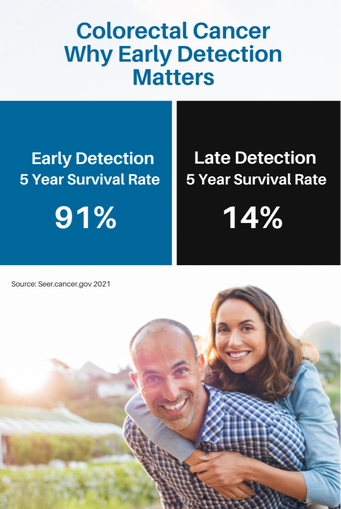ColonSentry®The First Liquid Biopsy for Colorectal Cancer Detection
ColonSentry® is a proprietary liquid biopsy test that uses advanced gene expression (mRNA) technology for the early identification of Colorectal Cancer (CRC). ColonSentry, was the first liquid biopsy for CRC, using our patented Sentinel Principle Technology Platform and has been used on more than 100,000 patients nationwide. (1-3)
Why Get Tested? |
For PatientsIf you're a physician who would like to offer this test in
your practice please click the button below. |
The Science
|
The ColonSentry® test uses quantitative real-time polymerase chain reaction (RT-PCR) to measure the RNA transcript expression of seven biomarker genes in a whole blood sample. Expression levels of six genes—ANXA3, CLEC4D, LMNB1, PRRG4, TNFAIP6, and VNN1—are each paired with the expression level of a reference gene, IL2RB, to create a genetic signature by which patients can be stratified for CRC risk. (3)
ColonSentry® specifically measures gene expression in whole blood. Tumors are known to affect the gene expression profiles of circulating leukocytes, including both myeloid cells (monocytes, macrophages, etc.) and lymphocytes (T cells, B cells, and natural killer cells).This occurs due to a unique interaction between tumor cells and the immune system that has been referred to as “cancer immunoediting.” Immunoediting comprises three stages: elimination (in which the immune system identifies cancerous and/or precancerous cells and attempts to eradicate them), equilibrium (in which the surviving tumor cells begin mutating rapidly under selection pressure from immune-system-mediated attacks), and escape (in which tumor cells that have acquired resistance proliferate uncontrollably, leading to tumor progression). (5) Validation
|
"The clinical utility of ColonSentry is significant. A routine blood test for patients who have yet to comply with any form of colorectal cancer screening can be a game-changer in identifying those at elevated risk for the disease and motivating them to have their colonoscopy. In addition, routine use of a blood test that detects both left-sided and right-sided lesions can increase the effectiveness of colorectal cancer screening by revealing the potential presence of neoplasms in advance of colonoscopy." - Robert Burakoff, MD, Site Chief for the Division of Gastroenterology and Hepatology at New York-Presbyterian Lower Manhattan Hospital and Weill Cornell Medicine, |
References
- Chao S, Ying J, Liew G, et al. Blood RNA biomarker panel detects both left- and right-sided colorectal neoplasms: a case- control study. J Exp Clin Cancer Res. 2013 Jul 23;32:44.Yip KT, Das PK, Suria D, et al.
- Liew CC, Ma J, Tang HC, et al. The peripheral blood transcriptome dynamically reflects system wide biology: a potential diagnostic tool. J Lab Clin Med. 2006 Mar;147(3):126-32.
- Marshall KW, Mohr S, Khettabi FE, et al. A blood-based biomarker panel for stratifying current risk for colorectal cancer. Int J Cancer. 2010 Mar 1;126(5):1177-86.
- Seer.cancer.gov Dec 2019 * 5-year Survival Rate



